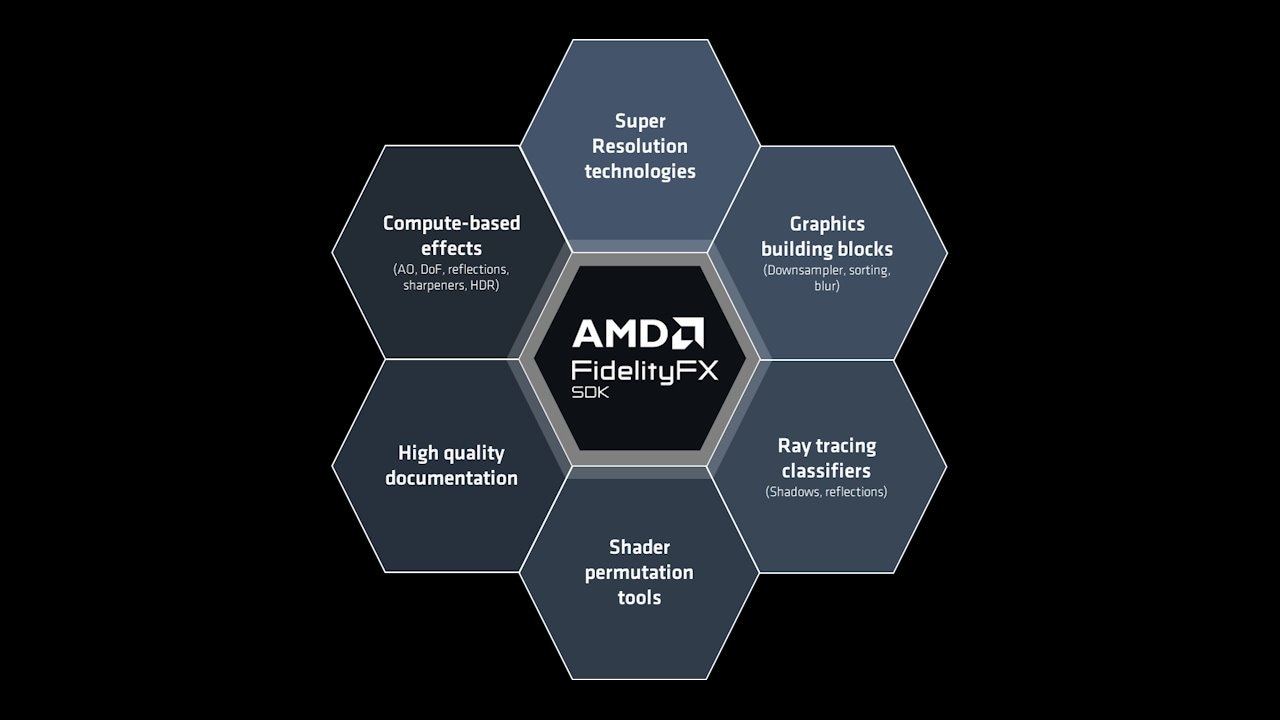
AMD FidelityFX™ SDK v1
The AMD FidelityFX SDK v1 is our easy-to-integrate solution for developers looking to include FidelityFX v1 features into their games.
** Note: GDC 2024 wrap-up is our main blog for GDC 2024, with our announcements and the published decks and videos – this blog below is our GDC preview **
We are just a week away from the annual Game Developers Conference. This event is always one of the biggest highlights of the year for us, where we announce our latest developments in the world of gaming graphics and share valuable advice and information to help you on your game development journey.
GDC 2024 is no exception, and we have a packed schedule of exciting talks we cannot wait to present to you!
Before diving into the details, we’d like to give a massive thank you to our special guests who are presenting with us this year. We’re extremely grateful for the time and effort given by Shawn Hargreaves (Microsoft® Direct3D®), Hampus Siversson (Massive Entertainment), Marco Bouterse (Nixxes Software), and Miguel Petersen (Striking Distance Studios) to make our awesome sessions even better for you all.
Firstly, we are once again honored to be invited to present at the Advanced Graphics Summit. This year, we have Matthäus Chajdas (Fellow, AMD) co-presenting with Shawn Hargreaves (Dev Manager, Microsoft Direct3D) on the revolutionary brand-new Microsoft Work Graphs API. You really, really don’t want to miss this one!
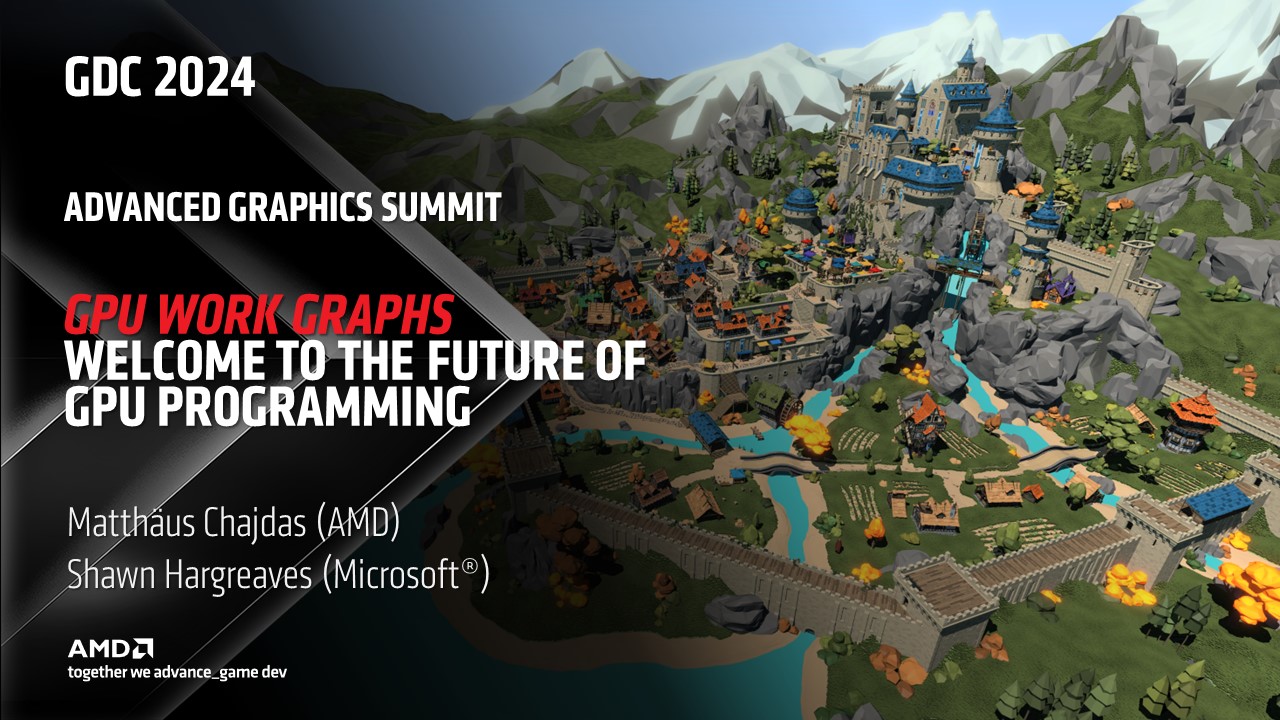
What?
GPU Work Graphs: Welcome to the Future of GPU Programming
When?
Monday March 18th at 1.20pm
Where?
Room 303, South Hall
Who?
Matthäus Chajdas (Fellow, AMD)
Shawn Hargreaves (Dev Manager, Microsoft Direct3D)
Work graphs are a brand-new API, allowing the GPU to self-schedule work without going through the host. Unlike previous APIs like ExecuteIndirect, work graphs allow for fully parallel producer/consumer relationships on the GPU. It allows for high-performance GPU work creation, efficient recursive algorithms, expansion and compaction, and many other things.
Join AMD’s Matthäus Chajdas and Microsoft’s Shawn Hargreaves for the first look at this brand new API and learn how it’s going to transform the GPU programming landscape going forward. Together they will provide insights into what workloads can benefit from work graphs short-term and where we expect long-term benefits. The audience will get an in-depth overview of the API, the changes to HLSL, and walk through a sample to get everyone equipped for experiments and integration into their own games and applications.
Matthäus will also be appearing as a panellist along with other industry-wide experts later on that Monday, at 5.30pm in the same place, for the Advanced Graphics Summit: All You Can Ask panel session. Make sure to bother him with your most awkward graphics questions, and tell him we sent you!
Rob Martin (Fellow, AMD) will represent AMD when he joins Microsoft (and some of their other partners) on stage on the Thursday (21st March), for Microsoft’s DirectX State of the Union session, which features Work Graphs and introduces DirectSR. We’re really excited to be invited to be a part of Microsoft’s session, and you’ll want to make sure you catch Rob’s presentations there!
As with previous years, we are presenting six sponsored sessions with our engineers and special guests. You can look forward to hearing about the very latest exciting developments and valuable information on AMD FidelityFX technologies, the AMD Radeon™ Developer Tool Suite, and AMD Ryzen™ CPU optimizations. In addition to those more familiar topics, we’ll also be presenting on mesh shaders, and the fantastic new shader instrumentation tool GPU Reshape.
All our sessions are an hour, which includes time for questions.
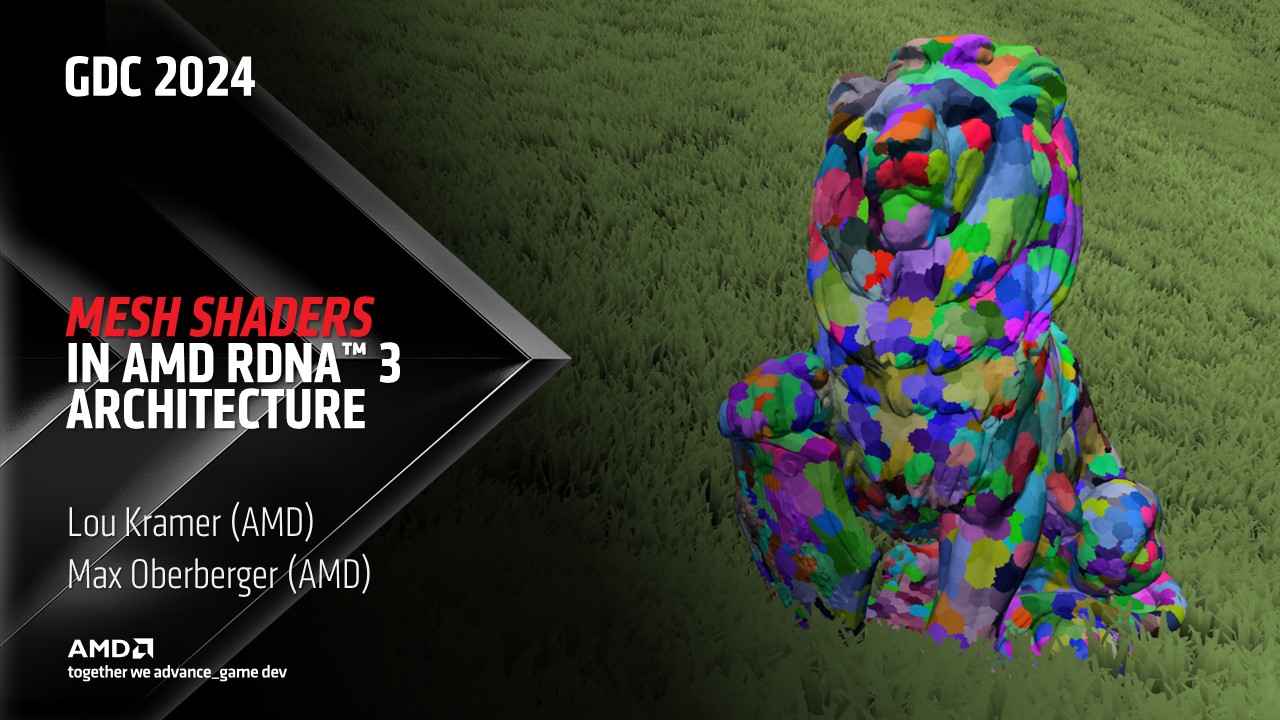
What?
Mesh shaders in AMD RDNA™ 3 architecture
When?
Wednesday March 20th at 9am
Where?
Room 3001, West Hall
Who?
Lou Kramer (Member of Technical Staff, AMD)
Max Oberberger (Senior Software Engineer, AMD)
This talk describes the mesh shader pipeline and how it maps to the AMD RDNA™ 3 architecture. It compares it with the traditional vertex and pixel shader pipeline and the compute pipeline highlighting similarities and differences from both an implementation perspective and a performance perspective. The performance aspects of mesh shaders will be discussed and how one can utilize the hardware efficiently when using mesh shaders.
The talk will also focus on the topic of meshlet generation and meshlet compression and how to optimize assets for mesh shaders. The audience should be able to determine whether using mesh shaders will benefit their use case or if the traditional vertex pipeline is preferable. This discussion will also explain how to use tools to analyze and debug mesh shaders and will explore a practical example of where mesh shaders might be useful.
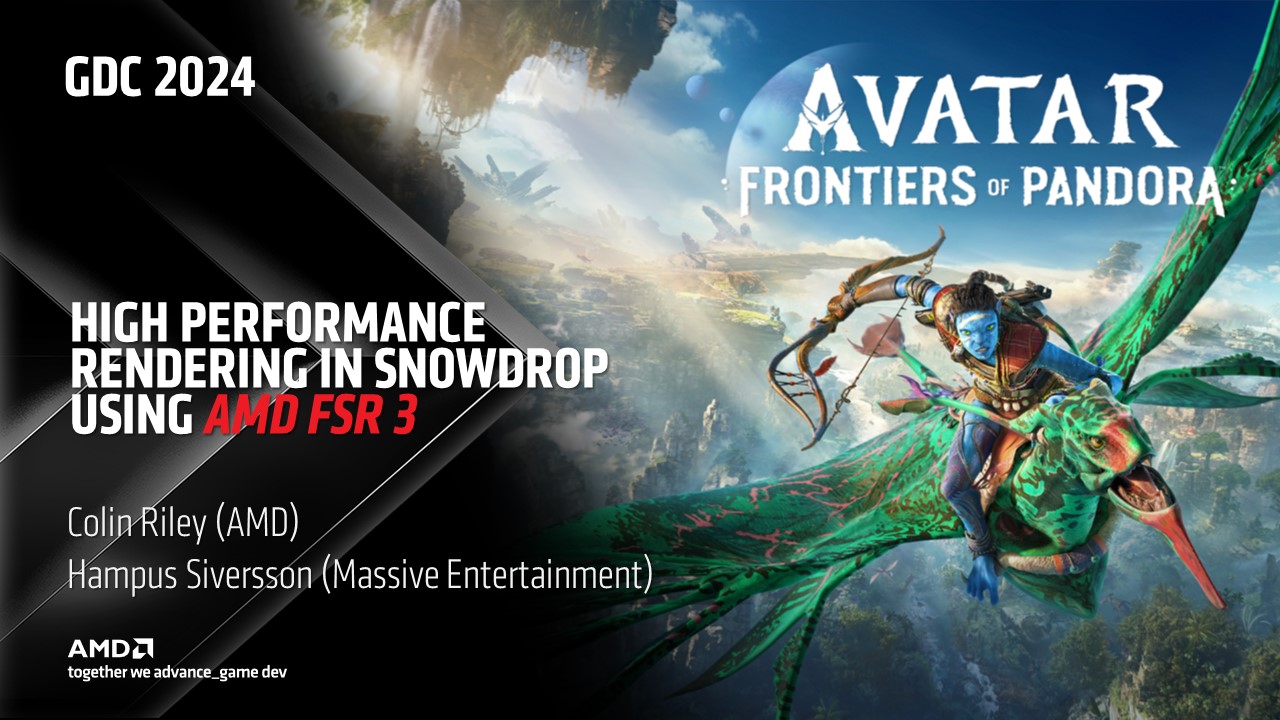
What?
High Performance Rendering in Snowdrop Using AMD FidelityFX™ Super Resolution 3 (FSR 3)
When?
Wednesday March 20th at 10.30am
Where?
Room 3001, West Hall
Who?
Hampus Siversson (Associate Lead Engine Programmer, Massive Entertainment)
Colin Riley (Senior Manager Software Development, AMD)
AMD FidelityFX™ Super Resolution 3 (FSR 3) is AMD’s open-source upscaling and frame interpolation solution. Massive Entertainment integrated AMD FSR 3 technology in the Snowdrop engine, which supports a variety of titles and platforms.
Learn about how the integration has been done to ensure FSR 3 is well integrated into their pipeline, which issues they were facing and how the integration helped to improve FSR 3 itself during its development process.
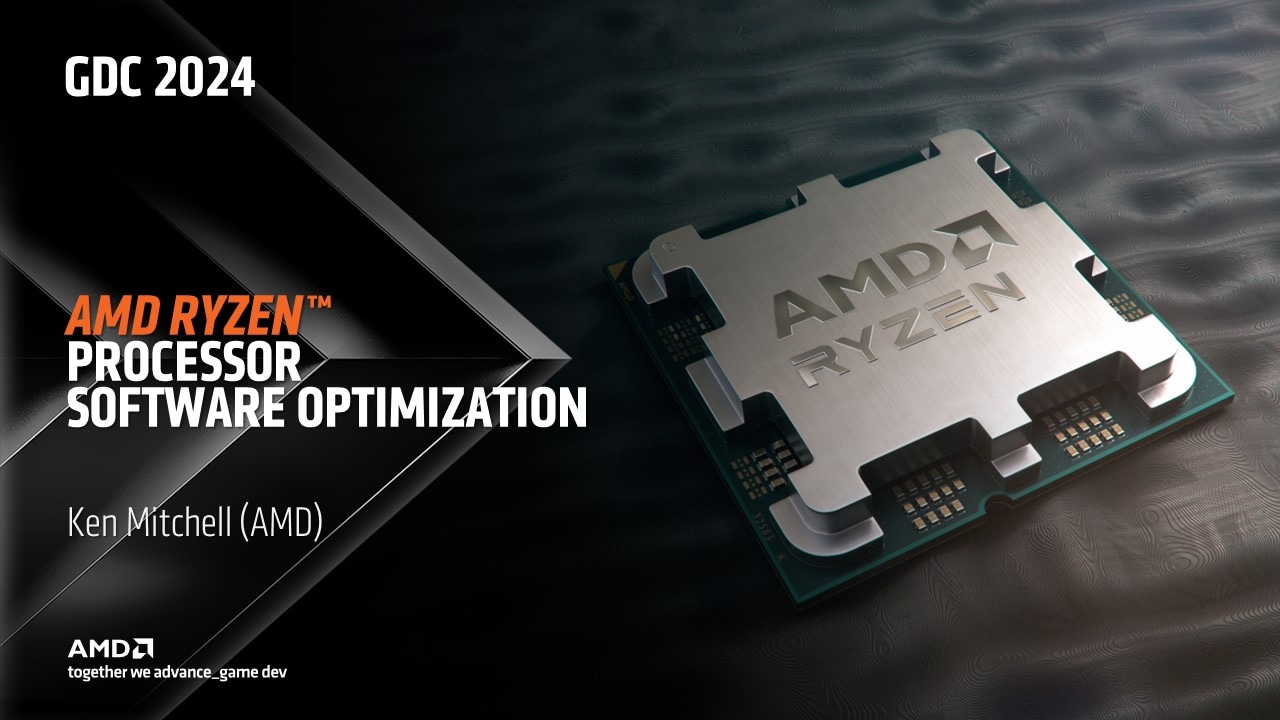
What?
AMD Ryzen™ Processor Software Optimization
When?
Wednesday March 20th at 12.30am
Where?
Room 3001, West Hall
Who?
Ken Mitchell (Fellow, AMD)
Break through CPU bottlenecks to reach higher frames-per-second and more builds-per-day equipped with AMD Game Engineering’s expertise forged through its rich history of partnerships with AAA game developers!
Learn about exciting AMD Ryzen™ products featuring advanced processor and graphics technologies powering today’s laptop, desktop, and workstation PCs.
Dive into data flow, simultaneous multi-threading, resource sharing, instruction set evolution, cache hierarchies, and coherency. Unlock powerful profiling tools and application analysis techniques using the Windows Performance Analyzer, Concurrency Visualizer, and AMD uProf.
Discover best practices and lessons learned. Upgrade system software and build settings. Attack valuable code optimization opportunities. Examples include C/C++, assembly, and hardware performance-monitoring counters.
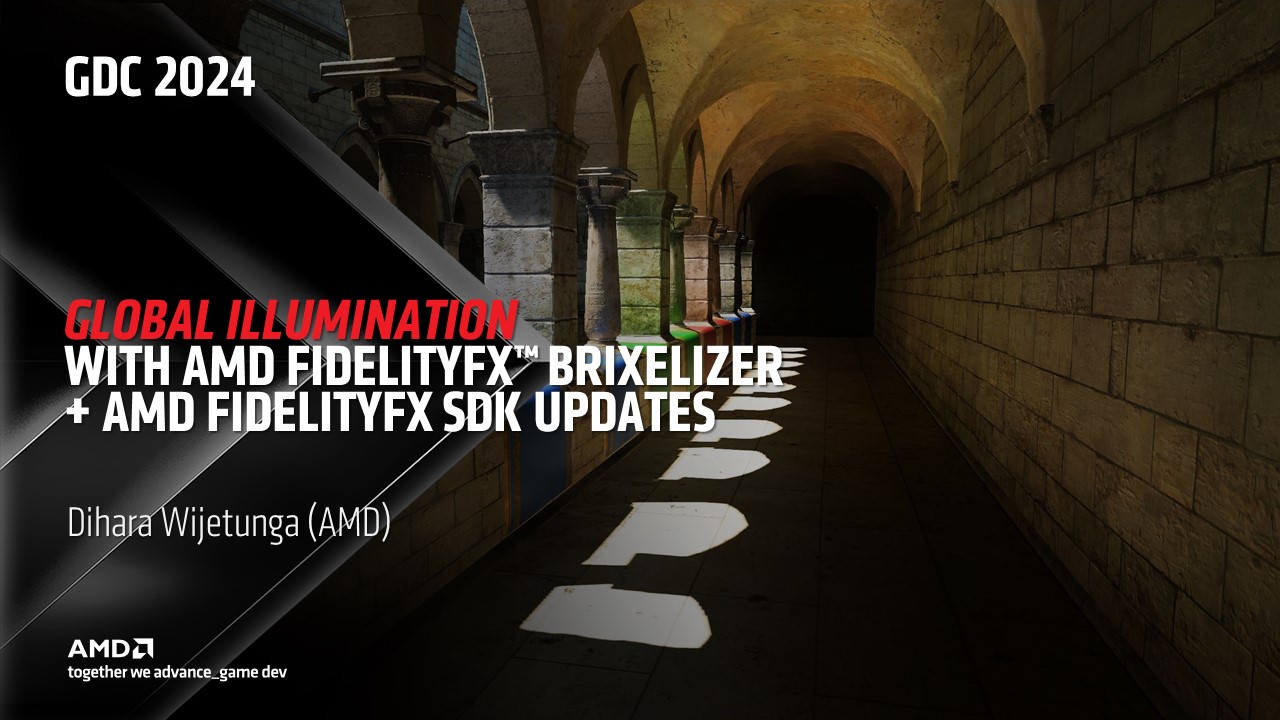
What?
Global Illumination With AMD FidelityFX™ Brixelizer, Plus AMD FidelityFX SDK Updates
When?
Wednesday March 20th at 2.00pm
Where?
Room 3001, West Hall
Who?
Dihara Wijetunga (Senior Software Engineer, AMD)
This talk will briefly discuss how the AMD FidelityFX™ Brixelizer works, then explore how diffuse and specular global illumination is implemented with sparse distance fields in Brix GI. This will provide a step-by-step breakdown of the algorithm and provide some of the solutions to problems such as populating the radiance cache and handling static and dynamic geometry.
The talk will also feature image quality comparisons to ground truth ray-traced global illumination and some initial performance numbers to provide the audience with an idea of what to expect from Brix GI. It will also showcase the Brix GI API and how it integrates into an existing Brixelizer integration.
This talk will also include a preview of new samples releasing with the new version of the FidelityFX SDK, as well as an update on the changes made to existing samples.
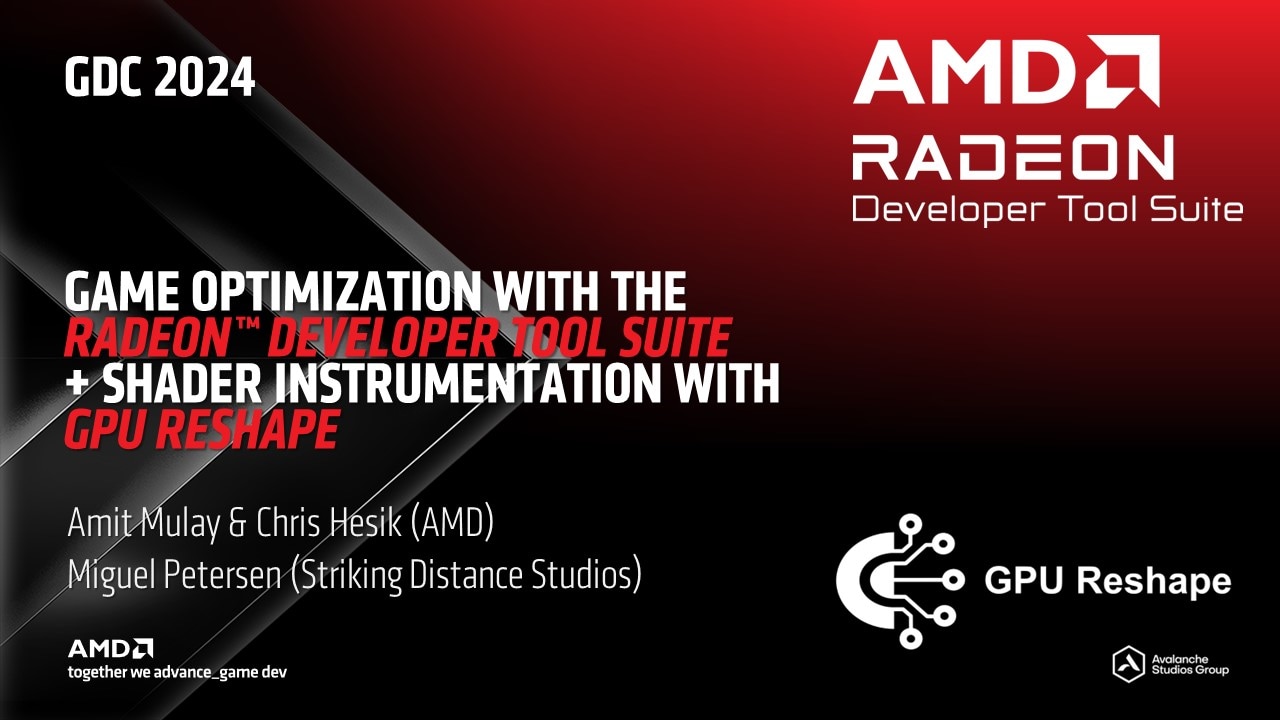
What?
Game Optimization With The Radeon™ Developer Tool Suite, and Shader Instrumentation With GPU Reshape
When?
Wednesday March 20th at 3.30pm
Where?
Room 3001, West Hall
Who?
Amit Mulay (Senior Software Development Engineer, AMD)
Chris Hesik (Principal Member of Technical Staff, AMD)
Miguel Petersen (Senior Rendering Engineer, Striking Distance Studios (Spain))
In this two-part session, we will first present the latest enhancements in the Radeon Developer Tool Suite, a rich set of GPU profilers and analyzers and a recently-added GPU crash analysis tool. We will show how developers can use the tools to optimize game performance and get insights into how games are running on AMD Radeon GPUs. We will also present a completely redesigned Radeon Developer Panel and show how it can be used to quickly obtain the data to feed into the other tools in the suite.
Next, Miguel (Striking Distance Studios) will present GPU Reshape, a just-in-time instrumentation framework with instruction level validation of shader operations. We discuss the challenges with instrumenting across multiple intermediate representations, and how a unified model was achieved through a custom intermediate language featuring seamless bi-directional translation. We’ll take a deep dive into current validation methodologies and what the future of instrumentation may look like.
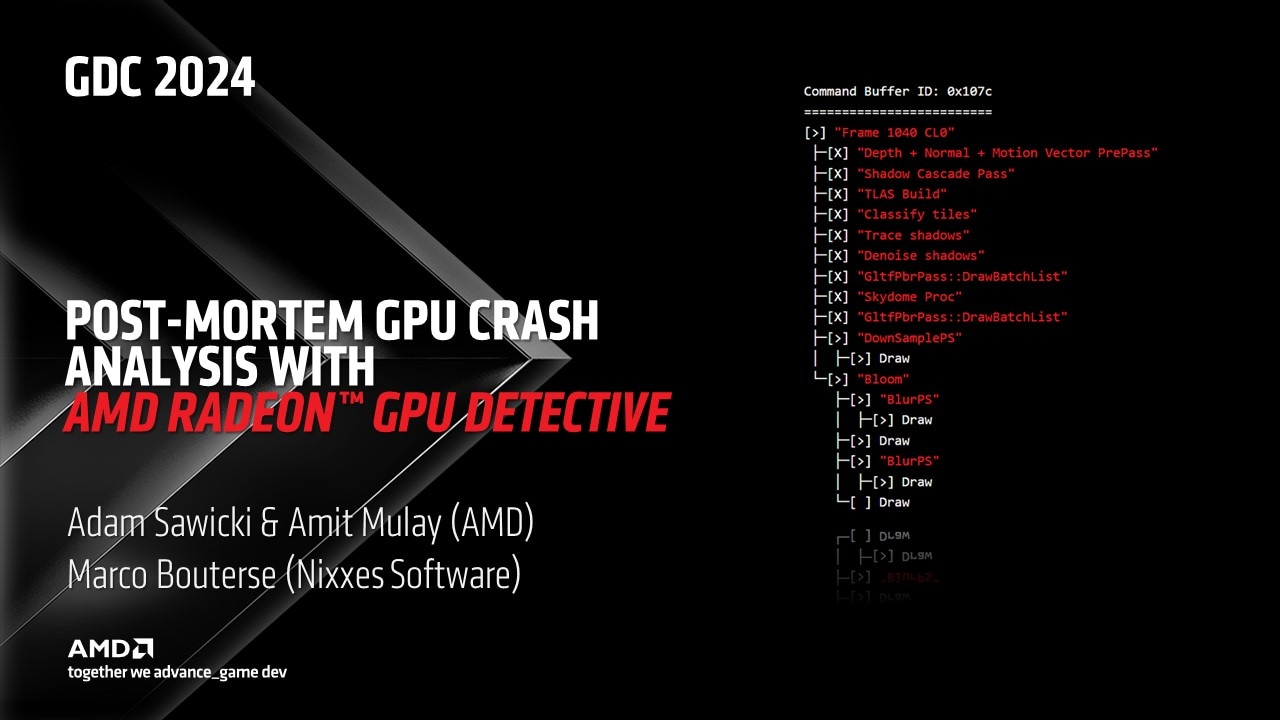
What?
Post Mortem GPU Crash Analysis with AMD Radeon™ GPU Detective (RGD)
When?
Wednesday March 20th at 5.00pm
Where?
Room 3001, West Hall
Who?
Adam Sawicki (Principal Member of Technical Staff, AMD)
Amit Mulay (Senior Software Development Engineer, AMD)
Marco Bouterse (Principal Graphics Programmer, Nixxes Software)
The AMD Radeon GPU Detective (RGD) is AMD’s powerful new developer tool for post-mortem analysis of GPU crashes on Windows (TDRs). In this session you will learn about these types of failures – when they occur, why they are difficult to debug, and how RGD can help to quickly narrow down the search for a crash’s root cause.
You will learn how to capture and analyze AMD GPU crash dumps from crashing games, and how to interpret the information in the Crash Analysis reports that the tool generates. You will also hear a story about a specific crash in a game that the tool helped to investigate and fix.
We hope to see you at GDC, but if you can’t make it this year, you’ll want to keep an eye out for our videos later on. Remember to follow us on Mastodon and Twitter/X to be the first to hear our announcements.